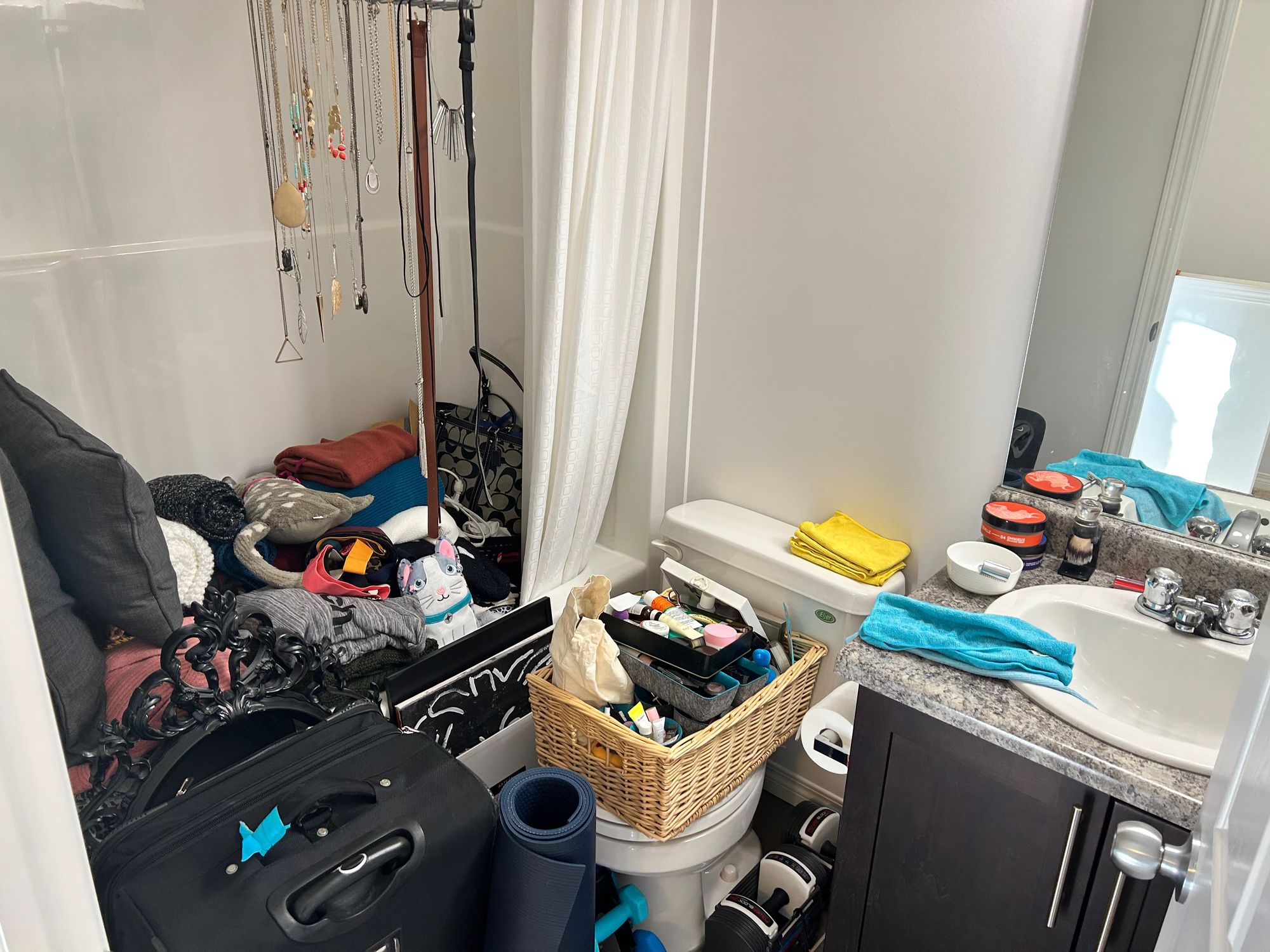How To Be Flexible When Life Gets Chaotic
When your best-laid plans go sideways, learn 4 ways to adjust and keep moving forward.

My husband and I keep a tidy, clean house. We have no children and, though there are cat toys scattered throughout, my introverted, type-A nature means it’s generally quiet and uncluttered, and everything has its place. It’s my place of sanctuary.
And, for an entire month, the house was a disaster as we undertook our first renovation.
Each morning and night we shuffled furniture from room to room, up and down the stairs. The walls were empty of pictures and art. Every room was a mishmash of whatever furniture needed to fit in it on that particular day. There were contractors in and out nearly every day, stomping around in dirty shoes and sawing and banging for hours at a time. There was sawdust on every surface.
Like me, our cats were upset with all the change and noise. They communicated their displeasure by waking us up several times most nights, usually forcing us out of bed around 5:00 am.
Several times each day, as I sat at my kitchen table on a plastic folding chair and listened to the cacophony of sounds reverberating through my house, I took a deep breath and reminded myself that the chaos wasn’t forever.
I knew that it was short-term pain for long-term gain. I knew it would be over soon.
And it couldn’t be soon enough.
For those of you who know me, even a little, you can imagine how disruptive this renovation was. My sense of order was deeply offended by the mess and lack of routine. My introverted nature was exhausted by the noise and constantly being surrounded by other people, not to mention having them invade my place of rest. They were first-world problems without a doubt, but they still took a toll.
While my situation was a renovation, you too will likely experience disruptions to your carefully laid plans and routine with something. Be it an unexpected visit from a family member, moving offices, changing jobs, travelling, or the like, there will eventually be something that stretches (or completely obstructs!) your ability to do the things you want to do, when you want to do them, and in the way you want to do them. There will eventually be a little chaos.
Instead of trying to do all the regular things in your life that you usually do AND deal with the new thing, remember that there are decisions you can make to adjust, be flexible, and remove to make it easier on yourself and the people around you.
Here are four things you can do to adjust when things got chaotic:

1. Stick to your habits (as best you can)
It's easy to stick to good habits when things are going smoothly. It’s when things get challenging that they tend to get thrown out the window. The worst part is, it’s when things are challenging that you need your good habits most!
Instead of dropping your good habits altogether, think about how you could adjust them during this time to accommodate your new circumstances. Maybe you can’t do things like read, exercise, meditate, journal or meal plan exactly the way you’re used to but what if you tried to:
- Do it less frequently
- Do it at a different time of day
- Do a modified version
- Do it for a shorter period of time
For myself, I kept up my daily fitness (keeping the streak alive!). Our normal routine is to work out before lunch, which works for us because we have flexible schedules and work from home. Obviously, that wasn’t going to happen with contractors in the house so I instead worked out first thing in whatever open floor space I could make or find.
Hold tight to why the good habit is healthy for you in the first place and why it’s important to keep it in your life, especially when things are hard.
2. Plan for the worst
If you know things are going to be chaotic for a time, you can do your best to plan for it.
One of the ways to do this is through aggressive calendar management. Y’all know I am all about Time-Blocking and Imagining Your Ideal Week. When things get challenging they are, by nature, not ideal. But you can still map out your commitments given what you know about your day or week. It’s about setting the intention for your ideal week given the circumstances you are in.
Some ways you can plan for the worst include:
- Say no to additional commitments
- Block more flex time in your calendar
- Give yourself more time to do things than you normally would
- Set expectations with your, family, friends, team or clients that some things might take longer than usual or not be done at all
Expectation management, both for you and others, is the key not to be disappointed or frustrated.
During the weeks I knew we would have contractors making noise in the house, I pushed as many meetings back as I could. I also blocked off some of the days in my calendar that I normally leave open for meetings.
3. Space, grace and accepting help
The theme I set for 2023 after doing my annual reflection for 2022 was Space and Grace. In this context,
- Space means making room for the thing you are dealing with by adjusting/letting go of/setting aside other things
- Grace means being kind and understanding to yourself (and others) as you navigate your challenge
As you well know, the world does not stop turning just because things are hard for you. But you often have more power than you think over the decisions you make, what you accept, and whether you ask for what you need.

Ask for and take space
Regardless of if your challenging time is as minor as a home reno like ours, or something more serious like a family illness, if you need some extra time and space, you can both ask for it and take it.
For my fellow people-pleasers, asking for and taking space is hard. I get it, but I promise you that most people are kind, understanding and happy to oblige. You could:
- Ask to move a meeting to another day or week so you can deal with your challenge
- Push a deadline back
- Ask a friend for a rain check when you don’t feel up to hanging out
This is another situation where you can flip the script:
Think about how you would react if someone else made the request you want to make…to you. What would you say or think? Would you be offended or upset with them in any way? Probably not. Most of the time you would be totally good with it and it would be no big deal. Why would it be any different when it’s you asking?
I did all three of the things listed above. And nothing bad happened!
Give and take some grace
When things are hard, it’s counter-productive to beat yourself up for not “performing” at your usual level. But it’s a common reaction. Instead of feeling guilty for struggling to focus or not getting as many things crossed off your to-do list as you want, give yourself some grace.
Grace means lowering your expectations for what you can do during this time. It doesn’t mean that you aren’t doing your best, but rather that your best has shifted to include the challenge you are dealing with.
Likewise, if there are others impacted by the challenge you are dealing with, remember that it’s hard on them too. It’s easy for tempers to flair and small things to escalate when everyone’s stress levels are high. Try to remember that you are not the only one who might be struggling and adjust your expectations for them too.
Accept help
When things are hard, your friends, family, and colleagues might ask if there is anything they can do to support or help you. If you are anything like me, your instinct might be to say, “No, thanks!”. But, what if you said… yes?!
Help comes in many forms:
- What if someone made a meal for you and your family?
- Or drove the kids to their various activities?
- Or gave you a space to share what you are dealing with?
- Or stopped by with a muffin and a latte (Thanks, Sooze!)?
Yet again, flip the script. When you make an offer of help to people you care about, it feels good to be able to do so. The same goes for people who offer to help you. All you have to do is say, “Yes, thank you.”
4. Take good care
It’s with no small irony, I did a phone interview with the HuffPost to contribute to an article titled 9 Quick Ways To Refocus If You're Distracted At Work… while hiding out in the corner of my bedroom, which was the only place on that particular day that had a clear space to sit in relative (if brief!) quiet. 🤦♀️
While I was not able to use all of the advice on the list during this time, I did try to practice what I preached and take care of myself. I have written before about using the tools of resilience when life happens. In this case, they were keeping to the basics:
- Get a good sleep each night
- Eat well and regularly
- Make movement part of everyday
- Take breaks
It’s easy to let these slip when things get out of hand, but they are the foundation you will be able to build on as you navigate the chaos and help give you the resources you need to calm things down.
The renovations are finished and I’m ever so happy to have my house back. Everything needed a good cleaning and it will take some time for everything to go back in its place, but our home looks very nice and we have been able to get back to our usual routines… until the next bit of chaos!
There will always be the ups and downs of life, some more chaotic than others, but you have more power than you think to make intentional decisions about what you can adjust and change to make it a bit easier to manage.
Are you having a hard time adjusting to a new life challenge? Let's chat about how I can help.
Share
Ashley Janssen

Productivity consultant, writer, speaker, serial entrepreneur, chaos calmer, introvert, cat-lady. Lover of books, fitness, old fashioned’s, basketball, and video games.
Follow me on
Twitter
or
LinkedIn.
Hire me for
1 on 1 productivity consulting
or
speaking.
Related articles

What It Really Means To Be Calm

Preparing For The Long Winter Ahead


Comments ()